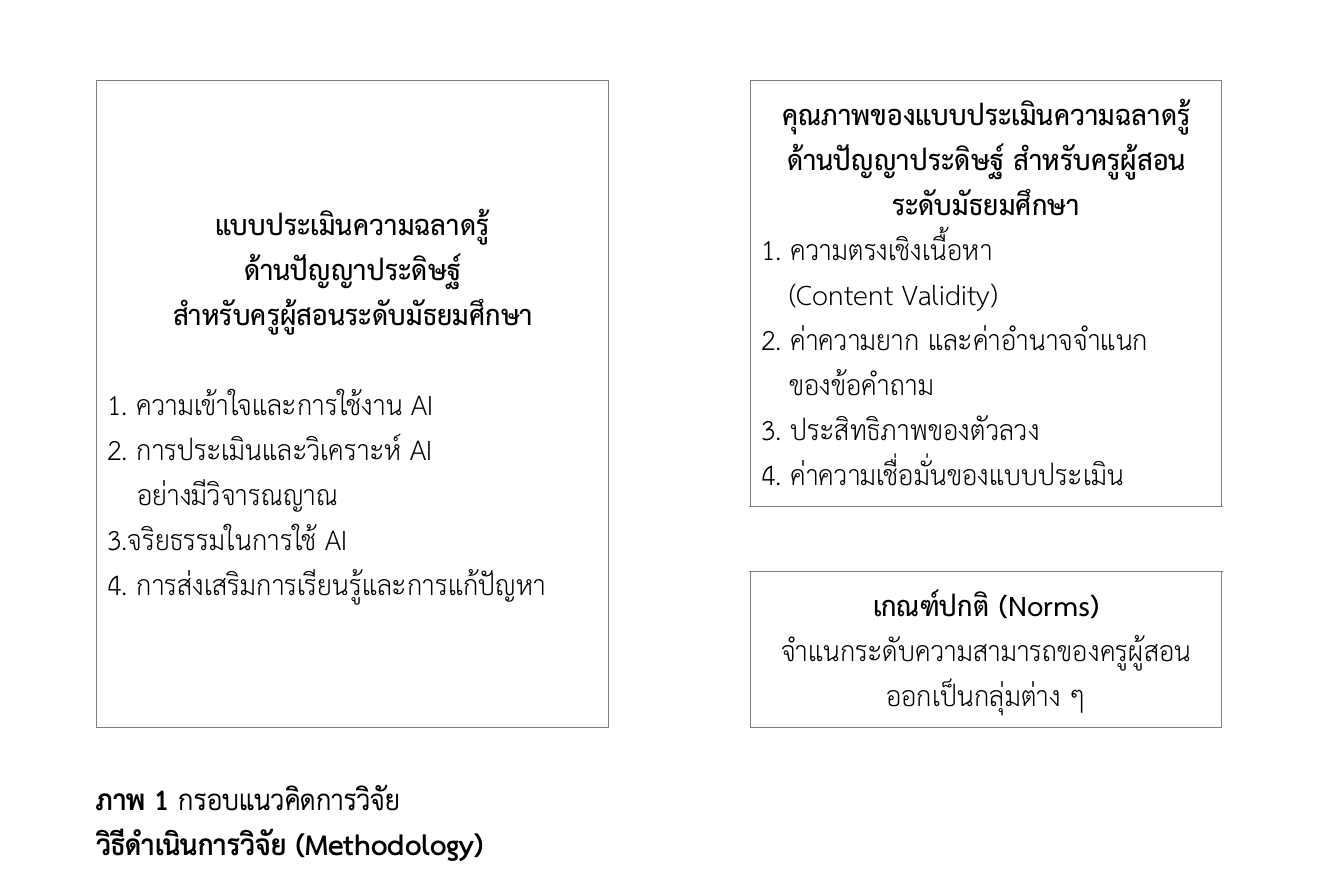Development of an Artificial Intelligence Literacy Assessment Tool for Secondary School Teachers
Main Article Content
Abstract
This research aimed to 1) develop and examine the quality of an Artificial Intelligence Literacy (AI Literacy) assessment tool for secondary school teachers, and 2) establish normative data (norms) for the assessment. The sample consisted of 241 in-service teachers under the jurisdiction of the Pathum Thani Secondary Educational Service Area Office in the 2024 academic year. The participants were selected using a multi-stage sampling technique. The research instrument was a 40-item multiple-choice AI Literacy assessment covering four key components: (1) understanding and utilization of AI, (2) critical evaluation and analysis of AI, (3) ethical use of AI, and (4) promotion of learning and problem-solving through AI.
The results showed that the item-objective congruence (IOC) index ranged from 0.60 to 1.00. The item difficulty indices (P-values) ranged from 0.23 to 0.76, and the item discrimination indices (r) ranged from 0.31 to 0.67. The reliability coefficient (Cronbach’s Alpha) was 0.89, indicating a high level of internal consistency. The norms were established using Z-scores and T-scores, allowing the classification of teachers’ AI literacy levels into five categories: Very High (22.4%), High (35.2%), Moderate (28.6%), Low (9.8%), and Very Low (4.0%).
Downloads
Article Details

This work is licensed under a Creative Commons Attribution-NonCommercial-NoDerivatives 4.0 International License.
แนวคิดและข้อเสนอแนะที่นำเสนอในบทความของวารสารการบริหารและความเป็นผู้นำทางการศึกษา มหาวิทยาลัยรามคำแหง เป็นแนวคิดที่มาจากผู้เขียน หากมีความผิดพลาดใด ๆ ผู้เขียนเป็นผู้รับผิดชอบแต่เพียงผู้เดียว
ทั้งนี้ บรรณาธิการ กองบรรณาธิการ และคณะกรรมการหน่วยจัดทำวารสารฯ จะไม่ก้าวก่ายความมั่นคงในหลักการตามความคิดของผู้เขียน
ดังนั้น บรรณาธิการ กองบรรณาธิการ คณะกรรมการหน่วยจัดทำวารสาร และมหาวิทยาลัย จะไม่รับผิดชอบใด ๆ จากผลที่เกิดขึ้นจากการนำเสนอแนวคิด และข้อเสนอแนะของผู้แต่งที่เผยแพร่ในวารสารฯ
References
Ayanwale, M. A., Adelana, O. P., ... and Ishola, A. M. (2024). Examining Artificial Intelligence Literacy among Pre-service Teachers for Future Classrooms. Computers and Education Open, 6, 100179. https://doi.org/10.1016/j.caeo.2024.100179
Bastani, M. (2024). The Risks and Rewards of Generative AI in Learning Environments. Journal of Artificial Intelligence and Learning, 32(2), 112-128.
Bower, M. (2024). Redefining Education Assessment in the AI Era: Challenges and Strategies for Teachers. Educational Research and Innovation, 29(1), 78-95.
Casal-Otero, L., Catala, A., … and Barro, S. (2023). AI literacy in K-12: A Systematic Literature Review. International Journal of STEM Education, 10, 29. https://doi.org/10.1186/s40594-023-00418-7
Chhatwal, R. (2023). AI’s Role in Personalized Education and Student Engagement. International Journal of AI in Education, 40(1), 22-39.
Comrey, A. L. and Lee, H. B. (1992). A First Course in Factor Analysis (2nd ed.). New York: Lawrence Erlbaum Associates.
Ding, C. (2024). AI-powered Learning Analytics: Implications for Curriculum Development and Student Engagement. Computers & Education, 186, 104551.
Ding, L., Kim, S. and Allday, R. A. (2024). Development of an AI Literacy Assessment for Non-Technical Individuals: What do Teachers Know?. Contemporary Educational Technology, 16(3), ep512. https://doi.org/10.30935/cedtech/14619
Farrelly, T. (2023). Generative AI in Content Creation: Ethics, Applications, and Future Directions. AI & Society, 38(2), 287-309.
Han, A., Zhou, X., …. and Peppler, K. (2024). Teachers, Parents, and Students' Perspectives on Integrating Generative AI into Elementary Literacy Education. CHI Conference on Human Factors in Computing Systems. https://doi.org/10.1145/3613904.3642438
Jaikaew, P. (2022). Needs Assessment Model for the Use of Artificial Intelligence in International Standard Secondary School Administration. (Master Thesis, Nakhon Sawan Rajabhat University). [In Thai].
Jauhiainen, H. (2023). Generative AI and Its Impact on Educational Institutions. Scandinavian Journal of Education, 28(4), 55-73.
Kaldaras, L., Akaeze, H. O. and Reckase, M. D. (2024). Developing Valid Assessments in the Era of Generative Artificial Intelligence. Frontiers in Education, 9, 1399377. https://doi.org/10.3389/feduc.2024.1399377
Laupichler, H. (2023). The Impact of AI-assisted Learning on Student Motivation and Achievement. Learning and Instruction, 79, 101648.
Long, D. and Magerko, B. (2020). What is AI literacy? Competencies and Design Considerations. CHI Conference on Human Factors in Computing Systems, 598. https://doi.org/10.1145/3313831.3376727
Ministry of Higher Education, Science, Research and Innovation. (2022). National Artificial Intelligence Action Plan for Thailand (2022–2027). Bangkok: Cabinet of Thailand. [In Thai].
Ministry of Digital Economy and Society. (2022). National Artificial Intelligence Action Plan for Thailand (2022–2027). Bangkok: Cabinet of Thailand. [In Thai].
Ng, D. T. K., Leung, J. K. L., …and Qiao, M. S. (2021). Conceptualizing AI literacy: An Exploratory Review. Computers and Education: Artificial Intelligence, 2, 100041. https://doi.org/10.1016/j.caeai.2021.100041
Pathum Thani Secondary Educational Service Area Office. (2024). Basic Education Teacher Statistics under the Jurisdiction of Pathum Thani Secondary Educational Service Area Office, Academic Year 2024. Pathum Thani: Pathum Thani Secondary Educational Service Area Office. [In Thai].
Phimpho, P. and Lincharoen, A. (2024). A Development of Mathematical Literacy Test for Grade 10 students. Journal of MCU Ubon Review, 9(2), 1300–1301. [In Thai].
Prongprommarat, J., Hongkhuntod, A. and Talasi, W. (2021). The Development of Sexual Literacy Scale and Norm of Secondary School Students. Sikkha Journal of Education, 8(2), 23–24. [In Thai].
Relmasira, P. (2023). Teachers' AI Literacy and Its Impact on Instructional Design and Student Learning Outcomes. Technology, Pedagogy and Education, 32(2), 145-161.
Sanamnoi, P., Srihaset, K. and Tippayakulpairoj, D. (2023). A Construction of Information Literacy Skills Scale for Mathayomsuksa Three Students. Interdisciplinary Academic and Research Journal, 3(1), 543–552. [In Thai].
Tenberga, I. and Daniela, L. (2024). Artificial Intelligence Literacy Competencies for Teachers through Self-assessment Tools. Sustainability, 16(10386). https://doi.org/10.3390/su162310386
Wang, L. (2023). Assessing AI literacy: A multidimensional approach. Journal of Educational Research & Innovation, 29(1), 102-127.
Wongwanich, S. (2015). Research and Statistical Data Analysis with SPSS and AMOS. Bangkok: Chulalongkorn University Press. [In Thai].
Winter, M. (2023). ChatGPT and the Future of Education: A Critical Analysis of AI-driven Assessment Methods. AI & Education, 31(4), 512-528.


